
Internet service provider Cogent Communications (NASDAQ:CCOI) missed Wall Street’s revenue expectations in Q2 CY2025, with sales falling 5.5% year on year to $246.2 million. Its GAAP loss of $1.21 per share was 29.9% below analysts’ consensus estimates.
Is now the time to buy Cogent? Find out by accessing our full research report, it’s free.
Cogent (CCOI) Q2 CY2025 Highlights:
- Revenue: $246.2 million vs analyst estimates of $248.1 million (5.5% year-on-year decline, 0.7% miss)
- EPS (GAAP): -$1.21 vs analyst expectations of -$0.93 (29.9% miss)
- Adjusted EBITDA: $48.5 million vs analyst estimates of $74.84 million (19.7% margin, 35.2% miss)
- Operating Margin: -12.8%, up from -18.1% in the same quarter last year
- Free Cash Flow was -$100.2 million compared to -$70.94 million in the same quarter last year
- Market Capitalization: $2.09 billion
Company Overview
Operating a massive network spanning 20,000 miles of fiber optic cable and connecting to over 3,200 buildings worldwide, Cogent Communications (NASDAQ:CCOI) provides high-speed Internet access, private network services, and data center colocation to businesses and bandwidth-intensive organizations across 54 countries.
Revenue Growth
Reviewing a company’s long-term sales performance reveals insights into its quality. Any business can put up a good quarter or two, but many enduring ones grow for years.
With $1 billion in revenue over the past 12 months, Cogent is a small player in the business services space, which sometimes brings disadvantages compared to larger competitors benefiting from economies of scale and numerous distribution channels. On the bright side, it can grow faster because it has more room to expand.
As you can see below, Cogent grew its sales at an excellent 12.4% compounded annual growth rate over the last five years. This shows it had high demand, a useful starting point for our analysis.
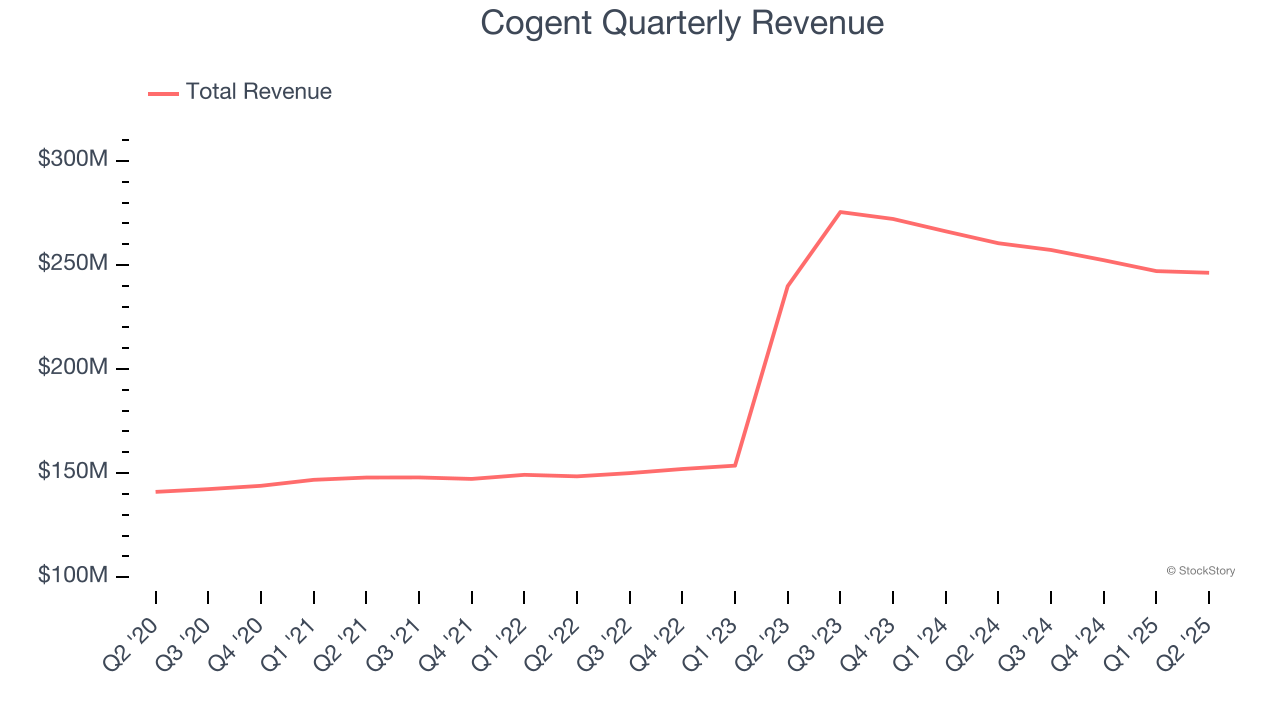
We at StockStory place the most emphasis on long-term growth, but within business services, a half-decade historical view may miss recent innovations or disruptive industry trends. Cogent’s annualized revenue growth of 20.1% over the last two years is above its five-year trend, suggesting its demand was strong and recently accelerated. 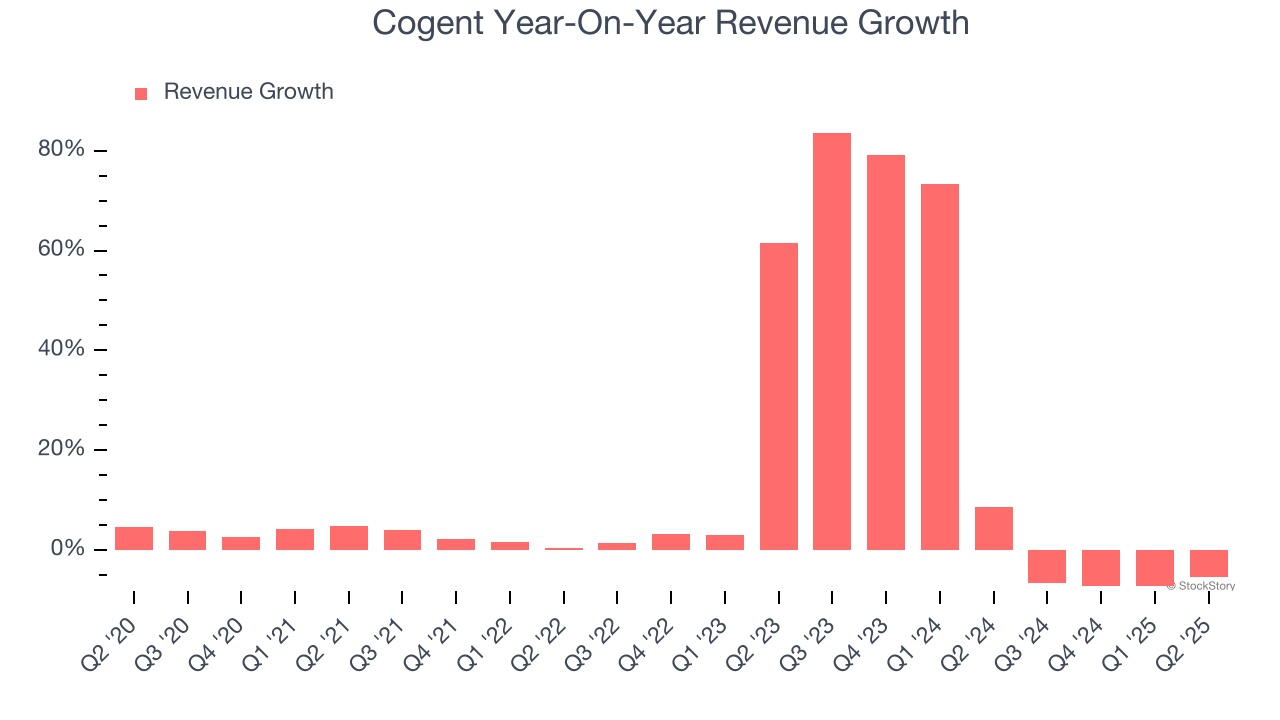
This quarter, Cogent missed Wall Street’s estimates and reported a rather uninspiring 5.5% year-on-year revenue decline, generating $246.2 million of revenue.
Looking ahead, sell-side analysts expect revenue to grow 3.8% over the next 12 months, a deceleration versus the last two years. This projection is underwhelming and indicates its products and services will face some demand challenges.
Today’s young investors won’t have read the timeless lessons in Gorilla Game: Picking Winners In High Technology because it was written more than 20 years ago when Microsoft and Apple were first establishing their supremacy. But if we apply the same principles, then enterprise software stocks leveraging their own generative AI capabilities may well be the Gorillas of the future. So, in that spirit, we are excited to present our Special Free Report on a profitable, fast-growing enterprise software stock that is already riding the automation wave and looking to catch the generative AI next.
Adjusted Operating Margin
Adjusted operating margin is an important measure of profitability as it shows the portion of revenue left after accounting for all core expenses – everything from the cost of goods sold to advertising and wages. It’s also useful for comparing profitability across companies because it excludes non-recurring expenses, interest on debt, and taxes.
Cogent’s high expenses have contributed to an average adjusted operating margin of negative 2.8% over the last five years. Unprofitable business services companies require extra attention because they could get caught swimming naked when the tide goes out. It’s hard to trust that the business can endure a full cycle.
Looking at the trend in its profitability, Cogent’s adjusted operating margin decreased by 34.8 percentage points over the last five years. This raises questions about the company’s expense base because its revenue growth should have given it leverage on its fixed costs, resulting in better economies of scale and profitability. Cogent’s performance was poor no matter how you look at it - it shows that costs were rising and it couldn’t pass them onto its customers.
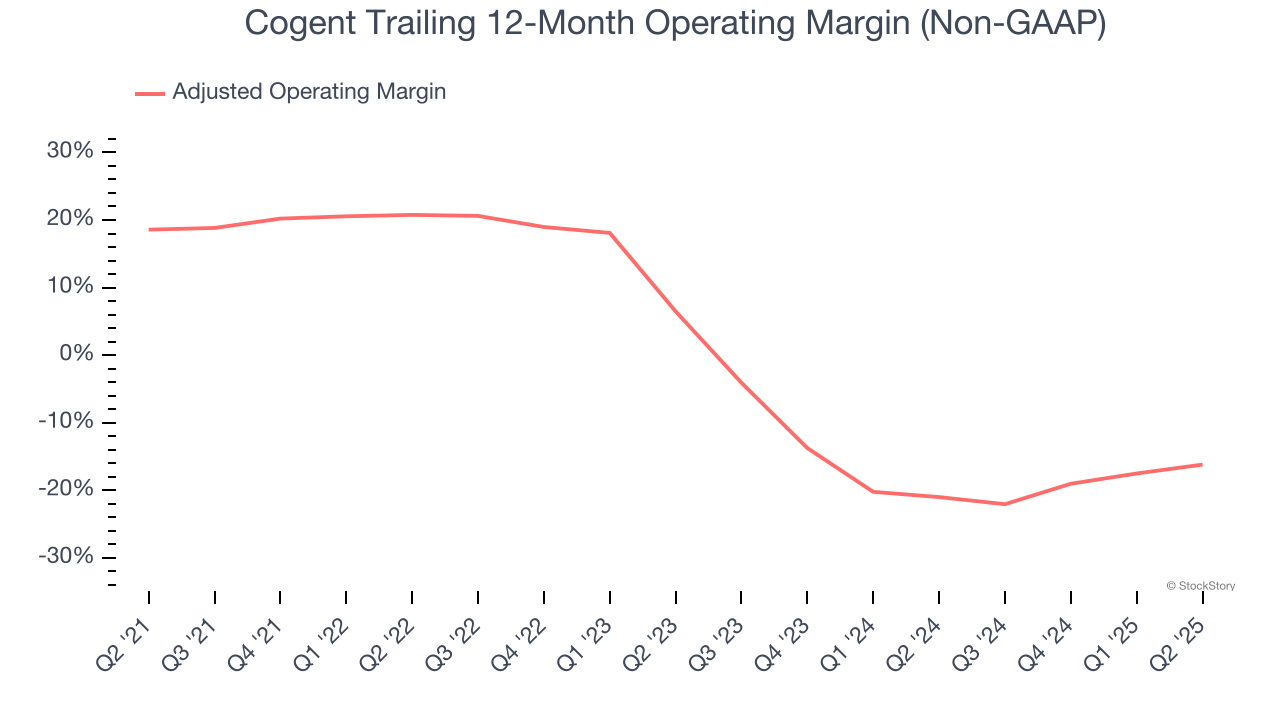
In Q2, Cogent generated a negative 12.8% adjusted operating margin.
Earnings Per Share
We track the long-term change in earnings per share (EPS) for the same reason as long-term revenue growth. Compared to revenue, however, EPS highlights whether a company’s growth is profitable.
Sadly for Cogent, its EPS declined by 49.2% annually over the last five years while its revenue grew by 12.4%. This tells us the company became less profitable on a per-share basis as it expanded.
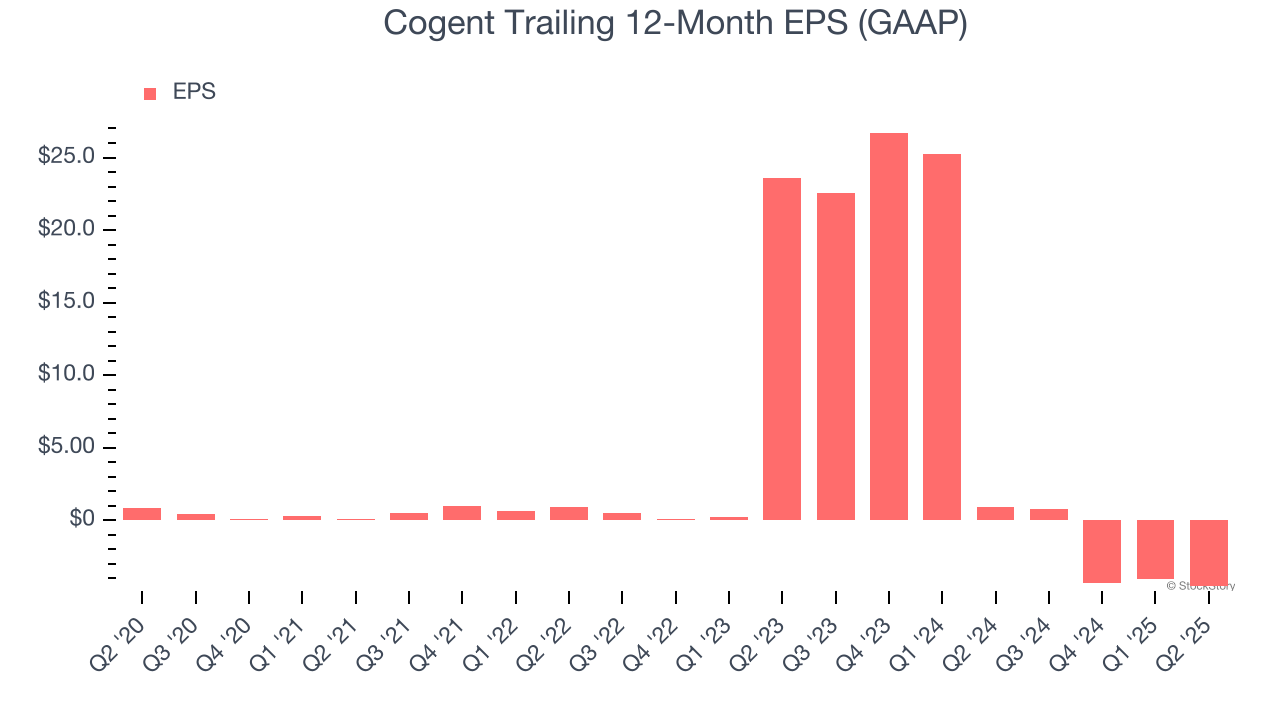
We can take a deeper look into Cogent’s earnings to better understand the drivers of its performance. As we mentioned earlier, Cogent’s adjusted operating margin expanded this quarter but declined by 34.8 percentage points over the last five years. Its share count also grew by 1.9%, meaning the company not only became less efficient with its operating expenses but also diluted its shareholders. 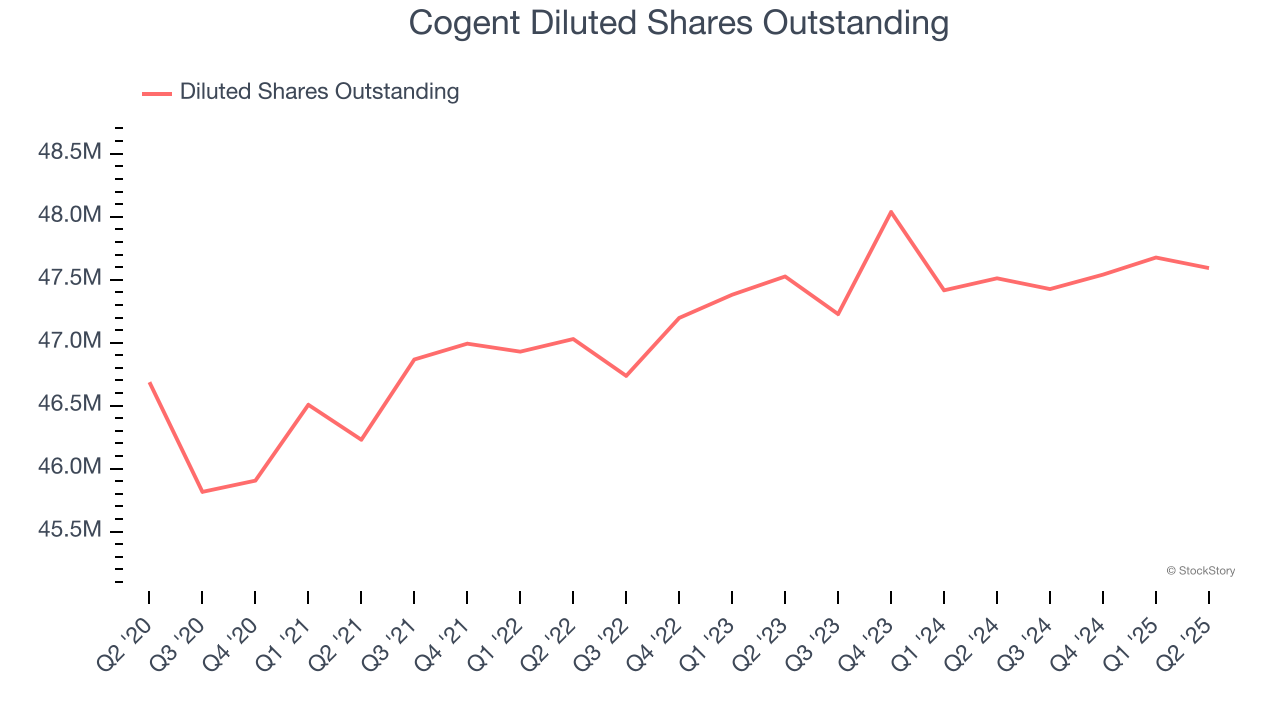
Like with revenue, we analyze EPS over a more recent period because it can provide insight into an emerging theme or development for the business.
For Cogent, its two-year annual EPS declines of 48.1% show it’s still underperforming. These results were bad no matter how you slice the data.
In Q2, Cogent reported EPS at negative $1.21, down from negative $0.68 in the same quarter last year. This print missed analysts’ estimates. Over the next 12 months, Wall Street expects Cogent to improve its earnings losses. Analysts forecast its full-year EPS of negative $4.55 will advance to negative $3.13.
Key Takeaways from Cogent’s Q2 Results
We struggled to find many positives in these results. Its EPS missed and its revenue fell slightly short of Wall Street’s estimates. Overall, this quarter could have been better. The stock traded down 18.4% to $35.80 immediately after reporting.
Cogent didn’t show it’s best hand this quarter, but does that create an opportunity to buy the stock right now? What happened in the latest quarter matters, but not as much as longer-term business quality and valuation, when deciding whether to invest in this stock. We cover that in our actionable full research report which you can read here, it’s free.
